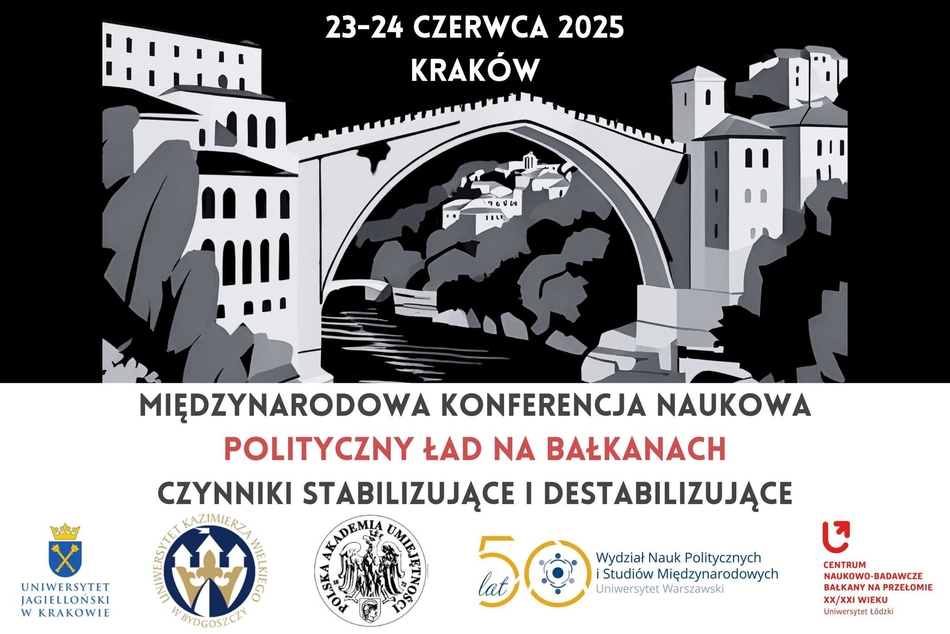
Subject and objectives of the conference
The multi-ethnic and multi-religious area of the Balkans has been considered an unstable region for over two centuries, threatening European and even world peace. Identifying the factors influencing the political and international order of the Balkans has been the subject of research by historians, political scientists, culture experts, sociologists and researchers of other disciplines dealing with this area. The Balkans were an area of conquest and imperial ambitions of many West and East powers. The 20th century, which changed the approach to statehood in international law, enabled nations that had not previously had the opportunity to achieve independence to achieve statehood.
The global processes associated with an approach to statehood led to almost 200 states, and many areas are still striving for this status. As a result of their rivalry, the region was subject to constant political, economic and national changes. Even the very concept of the Balkans has evolved and now extends beyond the geographical scope of the Balkan Peninsula. After the fall of the communist system, the Balkan nations have leaned towards democratisation in the dimension developed by Western countries in the second half of the 20th century. However, in some countries, this political direction did not go beyond the declarative sphere in the first decade. This did not mean ending disputes and conflicts within the peninsula either.
The order in the Balkans, which began to take shape at the threshold of the 21st century in post-war chaos for some and uncertainty for others, was calculated to achieve stabilisation, analogous to that which Western European countries had experienced. Inter-ethnic and international relations were laboriously developed. Hope was also placed in the processes of European and regional integration. At the same time, after the fall of communism, this area was a region in which the possibility of building new zones of influence appeared, which interested the great powers and international organisations aware of the fact that the location of the peninsula between the West and the East is crucial for shaping European policy.
The conference aims to show the complexity of the issues outlined above and present the conditions and factors influencing the construction of order on the Balkan Peninsula—both in domestic and international politics. The complexity of the topic is intended to show the region's multidimensionality and, thus, its importance and significance in local and global politics.
The conference is interdisciplinary, and its aim is to confront the latest research related to the Balkan region conducted in various disciplines. The organisers did not specify a time frame, assuming that the current problems of the Balkans go back far into the past, nor did they precisely define the geographical scope because the concept of the Balkans was understood differently in different historical eras.
Proposed thematic areas
- origins, course and effects of transformation processes on the Balkan Peninsula;
- place and role of regional actors in shaping international relations (regional and global);
- Balkans in the politics of global powers and forces;
- Balkans and integration processes in international relations;
- problem of regional security and its significance for the balance of international power;
- conditions, course and consequences of ethnic conflicts;
- ethnic and national problems: national diversity of the region, population movements and their causes, religious map;
- processes of creation and destruction of states, political systems of Balkan states;
- social movements and organisations in the era of populism;
- civil society in the Balkans and its influence on politics and transformation processes;
- media, information manipulation and disinformation;
- collective memory and transitional justice;
- contemporary integration processes.
Organising Committee
- Maciej Baczyński
- Spasimir Domaradzki
- Agnieszka Kastory
- Mirella Korzeniewska-Wiszniewska
- Magdalena Rekść
- Paweł Wawryszuk
- Rafał Woźnica
Organisational information
The conference will be held on June 23 and 24, 2025, in Cracow, at Reymonta 4 street. The conference languages are Polish and English. The conference will be a hybrid, a stationary form or via the Zoom Platform. The conference fee is 450 PLN (stationary participation) and 200 PLN (remote participation).
The organisers provide
- catering (lunch, dinner);
- publication of the text in the yearbook "Central European and Balkan Studies" https://ejournals.eu/en/journal/ssb (70 points on the ministerial list) in 2026;
- simultaneous translation.
Deadlines
Please register participation in the conference, including the title of the paper and a brief summary, by completing the registration form by March 31, 2025, to the following e-mail address: balkan.conference.cracow2025@uj.edu.pl. Conference fee should be paid by April 30, 2025 (the account number and transfer details will be provided later).
Contact
e-mail: balkan.conference.cracow2025@uj.edu.pl
